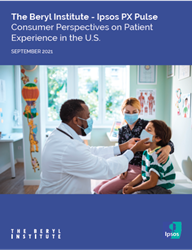
Consumers’ engagement in healthcare activities has increased significantly. Just over half of consumers have visited a primary care provider (51%)—an increase of 16 percentage points over Q3 2020.
NASHVILLE, Tenn. (PRWEB)
September 23, 2021
The Beryl Institute and Ipsos release findings from the sixth PX Pulse, a survey to track current perspectives on patient experience in healthcare across the United States. This report trends data related to the consumer experience from data first collected pre-pandemic in December 2019 through the current rise of the Delta variant in August 2021.
The report explores such topics as health system perceptions and trust, provider communications related to COVID-19 vaccines, consumer site of care, telemedicine preferences and racial and ethnic disparity.
Key findings include:
- Affordable insurance options and cost of health insurance premiums dropped as the most important healthcare issue, replaced by quality of care.
- Consumers’ engagement in healthcare activities has increased significantly. Just over half of consumers have visited a primary care provider (51%)—an increase of 16 percentage points over Q3 2020.
- Consumers continue to place great importance on having a good patient experience (95% rate as ‘Extremely’ or ‘Very important’).
- Consumers reflect a significant negative trend in perspective towards healthcare sectors in America as the Delta variant of COVID-19 continues to spread.
- Vaccine hesitancy is strong among those who have not received any vaccine doses, with 63% stating that they will ‘probably not’ or ‘definitely not’ receive the vaccine.
- Consumers who received COVID-19 vaccine information from their providers are more likely to be vaccinated, even if they do not directly attribute that decision to their provider.
- The issues of equity laid bare by the pandemic still are underlying factors that impact the ability to ensure the best in experience for all.
- Black respondents have a more negative view of the quality of care received based on race. Close to half of Black respondents from Q3 2021 (46%) compared to a quarter of Black respondents from Q3 2020 (26%) reported thinking that people who identify as White receive “much better” care.
“With the amount of change currently happening in healthcare and our broader society, and the reflection taking place overall as people traverse the pandemic, we see consumers starting to change their decision criteria to focus on quality and relying on sources they trust,” said Jason A. Wolf, PhD, CPXP, President & CEO, The Beryl Institute. “It reinforces the commitments outlined to transform human experience remain central and essential to healthcare’s future.”
To access the latest PX Pulse report, visit: https://www.theberylinstitute.org/page/PXPULSE_Sept2021
About the PX Pulse Survey
The Beryl Institute – Ipsos PX Pulse represents a first of its kind effort to elevate understanding of the current perspectives on patient experience in U.S. healthcare.
This effort regularly captures healthcare consumer perspectives of patient experience in the United States, determine the practices and processes that have the greatest impact and influence on healthcare consumers, and track how the market sees patient experience evolving over time.
About The Beryl Institute
The Beryl Institute is a global community of healthcare professionals and experience champions committed to transforming the human experience in healthcare. As a pioneer and leader of the experience movement and patient experience profession for more than a decade, the Institute offers unparalleled access to unbiased research and proven practices, networking and professional development opportunities and a safe, neutral space to exchange ideas and learn from others.
About Ipsos
Ipsos is the world’s third largest Insights and Analytics company, present in 90 markets and employing more than 18,000 people.
We have more than 30 years of experience working with physicians, hospitals, payers, brokers, and healthcare organizations on improving healthcare quality, increasing accountability, and advising on new and emerging health policy issues. For more information on Ipsos’ patient experience and healthcare contributions, you can follow Ipsos Public Affairs on LinkedIn and Twitter (@Ipsosus).
Share article on social media or email:

